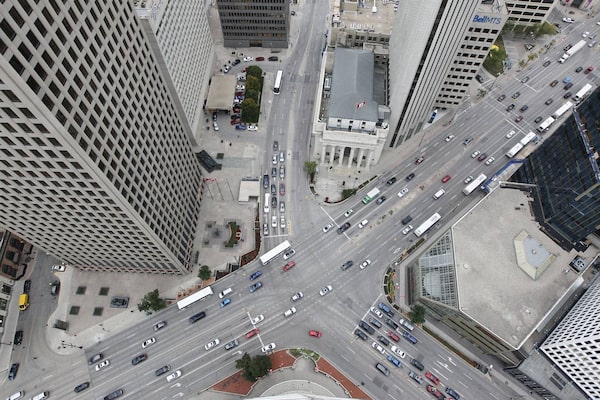
The intersection of Winnipeg’s Portage and Main has been dubbed the ‘crossroads of Canada,’ but has rarely been a gathering place for pedestrians in recent decades, save for a few hockey-inspired demonstrations.JOHN WOODS/The Globe and Mail
Winnipeg’s residents will get a direct say on whether people should be allowed to walk across the iconic intersection of Portage and Main after council voted for a rare public plebiscite.
Mayor Brian Bowman ran four years ago on opening access at the downtown spot – where concrete barriers currently prevent pedestrians from crossing – but has faced persistent attacks over the idea. On Thursday, he accepted a push by critics to consult the people as part of this fall’s election.
Although the plebiscite will be non-binding, leading politicians on both sides of the issue have pledged to respect the result.
“When it comes to our downtown, I think we all have a stake in it,” Councillor Jeff Browaty, who moved the motion calling for a plebiscite, said in an interview. “This is an opportunity now for all the facts to get on the table. We can have a large public debate on it. At the end of the day, we’ll have a vote, and then hopefully that’ll be the end of it.”
Council’s decision is a disappointment to urbanists and city-builders who had long hoped to make Winnipeg’s downtown core more hospitable to pedestrians and better for street-level business. But it offers hope for those who fear that removing the barriers would lead to crippling traffic problems.
Council’s 14-1 vote to go to the people is a step down for Mr. Bowman, who included a pledge to reopen the intersection in his winning 2014 campaign. On Thursday, though, he acknowledged that the issue is “polarizing” and said the public should weigh in.
“Should they vote to keep Winnipeg stuck in the 1970s, as some have argued that we should do, I’ll respect that in letter and spirit,” he told council. “If they choose to move forward with a much more progressive and accessible and engaging downtown … I’ll continue to take a common-sense and phased-in approach on that.”
Although Portage and Main – laid out where 19th-century ox-cart tracks converged − has been dubbed the “crossroads of Canada,” it has rarely been a gathering place in recent decades. There have been a few spontaneous street gatherings, notably an attempt to save the local hockey team and a celebration of their return, but most of the time, the intersection is the domain of drivers.
That is the result of a 1970s-era deal between the city and property owners to close the intersection to pedestrians. Those on foot were pushed downstairs into an underground passage that doubled as a mini-mall. Concrete barriers were erected at ground level to dissuade scofflaws.
The current situation has long been controversial and the issue is a perennial topic of heated debate in Winnipeg. Christopher Adams, a political scientist based at St. Paul’s College at the University of Manitoba, said that municipal voters tend to be older people, property owners who don’t like taxes. That suggests to him that the status quo will prevail, though he noted that a different dynamic could come into play instead. “There might be people who are older who have … this emotional memory of Portage and Main prior to the late ’70s when it was closed up, thinking well that’s really how it should be, it should be opened up,” he said.
“So it could go the other way."
Raymond Hébert, professor emeritus of political science at Saint-Boniface University, believes people will go with “the devil you know” and vote to continue the current situation.
“I personally think people are conservative, they don’t like change, so probably a majority would vote no to tearing down the barriers,” he said.
Canadians rarely have a chance to vote directly on specific issues, but such plebiscites do happen on a variety of issues.
In 2015, residents of Iqaluit voted strongly in favour of having a beer and wine store in the territorial capital. The store opened two years later. Also in 2015, residents of Metro Vancouver voted against a specific tax in which the revenue was dedicated to transit.
In April of this year, Calgary council voted to start the process for a plebiscite over the city’s bid for the 2026 Winter Olympics, with the vote expected this November. Also this fall, residents of Creston, a town in British Columbia, will be asked whether they back borrowing money for a new fire hall, and residents of Maple Ridge, BC, will be asked about a new charge for regular garbage pickup.
In Winnipeg, there have been municipal plebiscites only twice in recent memory. In the early 1980s, questions related to bilingualism and global nuclear disarmament were added to the municipal ballot. Both passed easily.
The iconic intersection of Portage Avenue and Main Street in Winnipeg has been called Canada's 'windiest intersection.' It's also been called 'the crossroads of Canada' – but it is not built for pedestrians.
 Oliver Moore
Oliver Moore